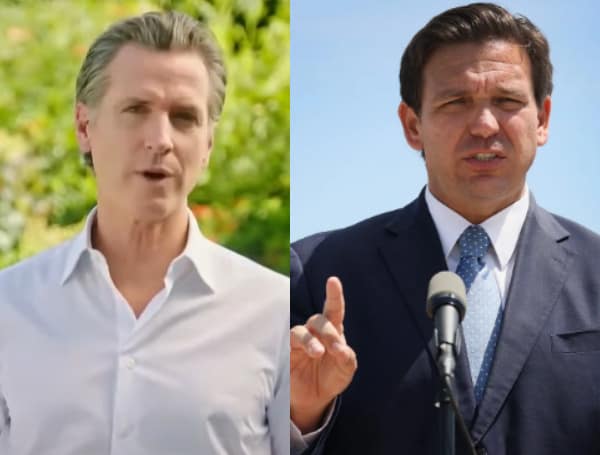On opposite coasts, two very different visions of freedom: In his Jan. 3 inaugural, Gov. Ron DeSantis, the massively re-elected (19-point margin) Republican of Florida, used the word “free” or “freedom” 15 times. And in his Jan. 6 inaugural, Gov. Gavin Newsom, the massively re-elected (18-point margin) Democrat of California, used the word “free” or “freedom” 22 times.
“The free state of Florida,” DeSantis declared, means deliverance from mandatory masks and vaccines, as well as from corporate-imposed wokeness. Moreover, Florida has no state income tax and boasts a booming economy; DeSantis said the Sunshine State is number one in growth, in new business formation and in overall “economic freedom.”
For his part, Newsom defined “freedom” much differently. For starters, he attacked DeSantis, without naming names, as an enemy of freedom, “for banning abortion, banning books, banning free speech in the classroom, and in the boardroom”— the last being a dig at anti-wokeness, a stance which Democrats regard as merely a thin cloak for racism and homophobia.
In the news: Appeals Court Turns To Florida Supreme Court For Help In Defining “Riot”
Not surprisingly, Newsom defined abortion as freedom. He even extended freedom to bodies of water. We should “celebrate the removal of four dams” along the Klamath River, he said, “setting the river free.” Newsom also mentioned that California, by itself, rates as the world’s fourth-largest economy, although he did not mention that it has the nation’s highest state income rates.
Can DeSantis and Newsom both be champions of freedom? Can their differing visions both be valid? One who wrestled with this question was Isaiah Berlin. In his 1969 essay, “Two Concepts of Liberty,” the eminent Oxford don contrasted “negative” and “positive” liberty.
According to Berlin, negative liberty is “the area within which a man can act unobstructed by others.” In other words, Don’t tread on me. By contrast, positive liberty is the empowerment of the “autonomous self,” and that oftentimes means getting help to escape the cruel forces of nature and injustice. In Berlin’s words, positive liberty “may be inflated into some super personal entity—a state, a class, a nation, or the march of history itself.”
Confronting his dichotomy, negative and positive, where did Berlin come down? Although “positive” is a nicer-sounding word, Berlin observed that negative liberty was “truer and more humane,” whereas positive liberty tended toward “authoritarian structures.”
So what will Americans think of these matters, operating, most likely, on a gut level, never knowing of Berlin’s cerebrations?
In the news: Lieutenant Gov. Jeanette Nuñez “We Have Solidified Florida’s Preeminence As The Freest State In The Union”
Interestingly, Newsom has already been eager to put forth his side of the argument: Last year he used campaign money to run a spot in Florida in which he declared, “Join us in California, where we still believe in freedom. Freedom of speech, freedom to choose, freedom from hate, and the freedom to love.” To many, that seemed like a presidential campaign ad, although Newsom has since said he will not seek the White House in 2024.
In the meantime, DeSantis has been mum about future plans. But were he to run for national office, he might say that the sort of “freedom” extolled in California includes rampant crime, homelessness and drug use.
That’s neither positive nor negative liberty — that’s disordered liberty, aka, chaos. In the meantime, of course, DeSantis is pursuing an agenda of ordered liberty: protecting life, opposing wokeness, supporting law enforcement.
One day, Americans in all 50 states may have to choose between these dueling definitions of freedom. Which is not to say that any election, or even elections, will settle this epic philosophical debate.
As Berlin wrote, “Human goals are many, not all of them commensurable, and in perpetual rivalry with one another.” So now today, the beat — negative vs. positive, red vs. blue — goes on.
James P. Pinkerton, a former White House domestic policy aide to Presidents Ronald Reagan and George H. W. Bush, and is a former Fox News contributor.
The views and opinions expressed in this commentary are those of the author and do not reflect the official position of The Free Press.
Android Users, Click Here To Download The Free Press App And Never Miss A Story. Follow Us On Facebook Here Or Twitter Here. Signup for our free newsletter by clicking here.

